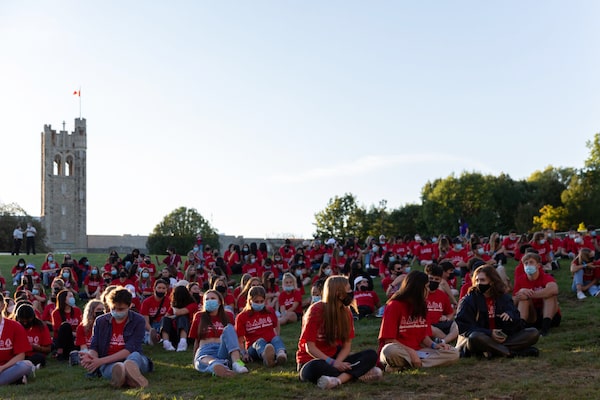
Students gather for programming at University College Hill on the first day of orientation week, on Sept. 6, 2021.Yifei Zhang/The Globe and Mail
An independent review of allegations of drugging and sexual assault at a University of Western Ontario residence during orientation week found evidence of at least one sexual assault and urged the school to address a number of issues, including what it calls troubling aspects of orientation culture such as overconsumption of drugs and alcohol.
The review, released by the university on Thursday, was led by legal scholar and Massey College principal Nathalie Des Rosiers and Sonya Nigam, executive co-ordinator of the Canadian Association for the Prevention of Discrimination and Harassment in Higher Education.
Its recommendations fall into three areas: addressing troubling aspects of the culture of orientation; improving the way orientation and emergency response is managed; and embedding the prevention of sexual violence into the fabric of campus life.
The university commissioned the report last year in the wake of allegations that circulated on social media saying that as many as 30 students had been drugged and sexually assaulted on a weekend in mid-September, 2021, at Medway-Sydenham Hall, a residence on the university’s London, Ont., campus. London police, following up on the allegations, interviewed 600 students but received no formal complaints. Although the police investigation remains open, no charges have been laid.
The report said it has evidence that “at least one student was sexually assaulted” in the Med-Syd residence, and that some women thought they had been drugged, and did not know how or when. The report’s authors write that London police have not laid charges, but add, “This does not mean ‘nothing happened.’’
“No one knows how many sexual assaults actually occurred during the orientation week,” they wrote, adding that many people may choose not to report, or do so in their own time.
Western president Alan Shepard said on Thursday that the events of September, 2021, have led the university to re-examine its culture and priorities, to change aspects of its approach to orientation, and to require students to complete an online course on sexual violence before they arrive on campus.
“These are issues that every university is dealing with in some way or other; this is not unique to Western. What might be unique is that Western is really making a strong commitment here, a pivotal commitment, to preventing sexual assault whenever possible, and caring for people who have experienced it,” Dr. Shepard said.
He added that the university is working to change its culture and to discourage the excessive consumption of alcohol.
“We have acknowledged that we have more partying than we would like, and we’re working with student leaders to dial that back a bit,” Dr. Shepard said.
The allegations that circulated on social media last year rocked the campus and prompted a walk-out where more than 10,000 students gathered to demand an end to sexual violence. Concerns about that weekend continued to loom throughout the academic year, with the student council in March declaring a sexual and gender-based violence crisis on campus.
A second report was also released Thursday by a university action committee on gender-based and sexual violence, which was created in the wake of last September’s allegations. The committee made 22 recommendations dealing with education, staffing, survivor supports and campus safety.
Dr. Shepard said the recommendations in the two reports, some of which overlap, are welcome and deserve careful study.
The Des Rosiers and Nigam review had a mandate to determine the chronology of events of September, 2021; identify policy or procedural gaps in Western’s response; and recommend changes, if required.
They conducted 47 interviews with students, faculty, administrators and emergency services personnel, reviewed social-media posts and viewed campus surveillance videos. Their conclusions were based on a balance of probabilities, a standard used in civil courts.
The review concluded that staff, student leaders and others responded according to policy, and that, although there were some gaps, “most actors responded as well as they could in a chaotic situation.”
Their review made 17 recommendations. They identified orientation week as an area of focus, particularly because of what they describe as the overconsumption of intoxicants.
“Overconsumption of drugs and alcohol may exclude some students, influence or even coerce others into actions that put them at risk or that they may regret. We suggest that some traditions ought to be revisited,” the review said.
Dr. Shepard said orientation week will undergo a re-examination led by university administrator Lisa Highgate, who will work with students to devise a new, more inclusive approach to orientation. The university will also appoint a special adviser to the provost to lead a gender-based and sexual violence committee.
Incoming student council president Ethan Gardner said he thinks the recommendations are all worthwhile starting points.
“The events of early September were a wake-up call to the issues surrounding Western’s campus and the culture here,” he said. “I would say that the greater campus community would agree that change needs to happen.”
Our Morning Update and Evening Update newsletters are written by Globe editors, giving you a concise summary of the day’s most important headlines. Sign up today.